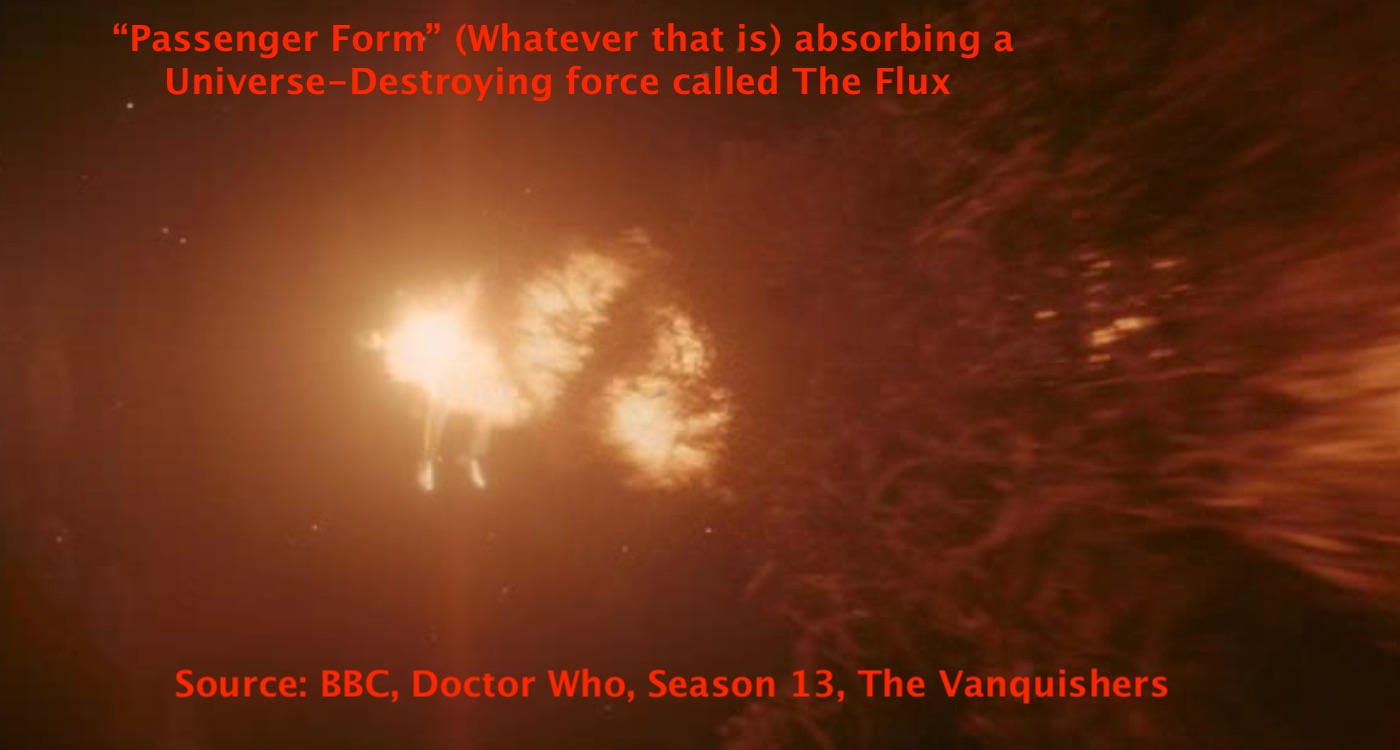; Date: Mon Dec 06 2021
Tags: Doctor Who »»»» Doctor Who Season 13 »»»»
We were sold The Flux as an awesome story, spanning a whole season, that would be full of excitement. Such a story should result in a stunning dramatic conclusion. There was sure a lot which happened in The Vanquishers, and the whole of Season 13, but why do I feel so disappointed and underwhelmed? Some stories, especially The Village of Angels, were excellent, but the season as a whole was scattershot, too many ideas, too much going on, too much jammed into the space, simply too much. It should have been three seasons or more, and instead it was one truncated half season.

I just finished my first watching of The Vanquishers, the final episode of The Flux, or Season 13. Instead of feeling intrigued, and excited, and trying to work it all out, I'm feeling let down.
I feel like these six episodes -- that's what a whole season is now, six episodes, how ridiculous -- should have been spread out over three seasons (or more). The story presented in Season 13 simply didn't have enough room to breathe.
There was so much material being presented that viewers were being rushed from one thing to another to another with no time to process anything, and neither did the characters have time to process anything.
In a way this story did start with the beginning of Whittakers run. The Timeless Child was mentioned in her second episode, The Ghost Monument. That episode featured some psychic sheets (talking rags) who read info about The Timeless Child from The Doctor. But, while that early start might have meant the Timeless Child story would have had room to breathe, that didn't help at all.
The problem with Season 13 is that Chris Chibnall tossed in so many story ideas that there wasn't enough space to cover them.
These ideas included:
- Sontarans who want to ride horses on earth
- Sontarans who are addicted to earth chocolate
- Sontarans with time travel
- Sontarans with psychic agents
- The Williamson Tunnels and giving a Doctor-Who-y backstory
- Atropos, and the Planet named Time, at coordinates 0,0,0 - a place The Doctor never heard of
- The Moori, beings who keep time regulated - something The Doctor never heard of
- The Lupari, a race never heard of before
- Whatever a race bond between Lupari and humans, and a backstory where Lupari are protecting humans?
- Lupari are tied up with Division
- Is it The Division or Division? And more details about (The) Division than we can track.
- The Timeless Child, and The Doctor searching for clues about her past, because for once in his lives The Master told the truth?
- This one Lupari who has a serious past with The Doctor that the Lupari cannot discuss? In one time-flash-back scene The Doctor is described as "a Dog", so did The Doctor have Lupari form once?
- Meeting Tecteun
- Watching the whole universe get destroyed
- But somehow the Flux universe destroyer process is stopped by one lone TARDIS setting up a protection field around The Earth?
- And the Sontarans plan to stop The Flux (which was destroying the whole Universe) by putting the Dalek and Cybermen fleets in front of it?
- And the Flux (that was destroying the whole Universe) could be stopped by one being (a Passenger Form) that can barely hold 500,000 people?
- How do random people suddenly know all about The Flux?
- What kind of military organization are Vinder and Bel part of that they know all about Passenger Forms? Especially given that The Doctor did not know about them? Oh, and how did Vinder know about TARDIS's?
- Just who is The Great Serpent if he's not The Master?
- Who are The Ravagers? Some kind of God Beings from before time? Or just some beings who can do powerful things? And what's their backstory with The Doctor?
- That waiter on the boat that tried to stop Yaz/Jericho/Dan, who had a serpent on his wrist, was a servant of The Great Serpent, but was he also a Division agent?
- Was that Serpent dude a Division agent?
- How did The Serpent know about TARDIS's?
- If The Master destroyed UNIT why was it The Serpent who did it?
- Isn't it a huge overreaction for The Division to destroy a whole Universe just because of The Doctor?
- The rational, that The Doctor gives people hope, is plainly ridiculous
- Just how did The Master destroy Gallifrey?
- Why wasn't The Master's plan a part of Season 13's plot? Where was he?
- Why was The Master so interested in Cybermen the last few seasons?
I think I'm missing a few things, but this gives a sense of how jammed this season has been with revelation after revelation. Nobody had time to process anything, neither the audience nor the characters in the show.
The resolution of this whole Flux thing -- when The Passenger Form (whatever that is) simply absorbed The Flux -- strikes me as symbolic of the whole season. Way too much stuff for a normal human to absorb and understand.
A clear example of this was the act of splitting The Doctor over three locations. Yes, it's getting across the idea that The Doctor is some sort of multidimensional being, but it was also a writers gimmick. The writer(s) needed to handle so many things at once, that they developed this gimmick about locationing The Doctor in multiple places so that she could handle three very different aspects of the issue simultaneously.
Were we supposed to feel impressed by this? Why do I instead feel tricked?
This idea of being in multiple places at once is an attribute of advanced spiritual mystics. For example, Father Padre Pio, during World War II, suddenly appeared before a bomber squadron who was about to bomb a place in Italy. Clearly he wasn't flying in mid air, but was actually in his cell in the monastery where he lived. But, by doing that he averted an unnecessary bombing, and unnecessary loss of life.
Among Tibetan mystics this is called bilocation. The Flux episodes could have portrayed such mystics with proper reverence, as old Doctor Who episodes did. But, Chibnall's portrayal of such mystics in Survivors of The Flux was a complete insult. I've met several Tibetan masters, and this portrayal of a bored Tibetan Rinpoche who wants to play stupid tricks with guests is extremely "off" and is beyond incorrect. In fact, such masters don't live in remote caves for the purpose of receiving visitors, but to engage in deep meditations where they cannot be disturbed sometimes for months at a time.
A possible way to broach the ability of The Doctor to bilocate might come about by a visit to Tibet. The First Doctor had visited Tibet and was friendly with the masters, so there is precedence for such a visit. In the course of such a visit, in-between fighting off whatever incursion was underway, there might have been a meeting with a master who understood very well the multidimensional nature of The Doctor. That master might have foreseen this Flux thing, and determined that for The Doctor to deal with it, that the master could pass along some wisdom related to bilocation.
For an example of a long term story arc properly handled in Doctor Who, think of one of the story arcs during the Matt Smith era. Namely - the question of whether Amy Pond was pregnant, whether Amy Pond was really Amy Pond, who was that woman who repeatedly barged in on Amy Pond, who were The Silence, who was River Song for real, and so on. That was also quite a lot of information for everyone to digest, but each portion of the story had its own space to breath, and we were able to follow the story at a good pace.
Another example was The Key To Time, a story involving The Fourth Doctor and Romana 1. They were sent on a quest by The White Guardian and were warned of The Black Guardian. These Guardians were some sort of Good/Evil principle who were constantly struggling over something. This was explicitly a season-long story, back when seasons were really and truly seasons, with a long story arc, but each individual story was itself very much worth watching.
Chibnall tried, and failed, at producing a massive story arc. He may have hoped to create something equal to The Key to Time, but he just wasn't up to the task. Compare Chibnall to Douglas Adams, who was instrumental to The Key to Time, and Chibnall simply falls short.











